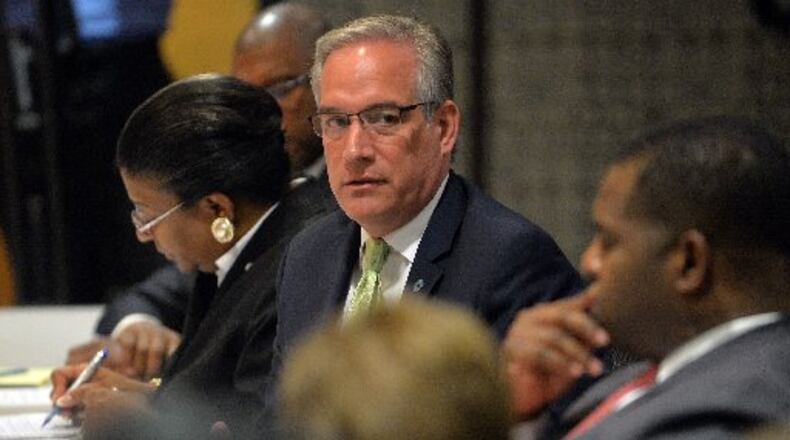Atlanta Beltline CEO Paul Morris stepped down on Wednesday, bowing to pressure from complaints that his efforts to add affordable housing along the planned 22 miles of trails and greenspace were anemic.
Morris made little progress on the ambitious plan's mandate to build 5,600 affordable homes along the project, which is turning a mostly abandoned railroad corridor in the heart of the city into a walkable network of trails, greenspace, and new development.
Instead, housing costs in Beltline neighborhoods soared, adding to the city’s affordable housing crisis and frustrating some of the project’s most important advocates.
Mayor Kasim Reed appointed Brian McGowan, a principal with the global law firm Dentons and former head of city economic development arm Invest Atlanta, to take Morris’ place. McGowan said in an interview with the AJC that he will convene a group of local and national experts to discuss the housing affordability as soon as he takes the agency’s lead Sept. 11.
“The biggest issue to tackle, on day one, is the affordability issue,” McGowan said. “I think the Beltline got sidetracked in recent years and more of its focus was on construction.”
Beltline creator Ryan Gravel praised the leadership overhaul, saying the Beltline’s grassroots supporters need to once again be allowed to shape how the ribbon of trails and transit will come to life.
"If all we're doing is fueling our own displacement we probably should stop," Gravel said. "I don't think that's what we're doing, but we have to be very intentional with that."
Affordable housing is defined as housing costing tenants 30 percent or less of their net monthly income. The annual median income for a family of four in Atlanta is about $67,500.
Morris was selected by the Beltline board in 2013 for his transportation and urban planning expertise. This was shortly after the opening of its wildly popular eastside trail, and experts were already warning that without big changes Beltline neighborhoods would become so expensive it would be as if no money had been spent on affordable housing at all.
The luxury development that followed transformed the historically black Old Fourth Ward from an affordable neighborhood of bungalows and apartments to a luxury destination where a new townhome can list for $800,000 or more. Skyrocketing taxes and rents are pushing longtime residents out, and those who live in other Beltline neighborhoods worry that they're next.
Frustrations over the project’s slow progress on affordable housing ran so high that in September 2016, Gravel quit the board of the Beltline’s nonprofit fundraising arm over this and other equity issues. Nathaniel Smith, founder of Partnership for Southern Equity, resigned from the Atlanta Beltline Partnership board with him.
Morris’ departure was a sign that Reed and other city leaders are taking affordability problems more seriously, Smith said.
“To be honest, it should have happened a long time ago,” Smith said. “The next leader of the Beltline is going to have to play catch up.”
Atlanta Mayor Kasim Reed praised Morris in a written statement, noting that the Beltline added four miles to the project by developing a $43 million extension of the westside trail and extended the southern end of the eastside trail under his leadership. The effort made the Beltline one of Atlanta’s most popular attractions with 1.4 million annual visitors.
“For the last four years, Paul Morris has brought an impressive depth of management experience to the Atlanta Beltline and I am grateful for his service to the city of Atlanta,” Reed said in a statement. “I am proud of Paul’s accomplishments and I wish him the best as he embarks on the next chapter of his career.”
Yet there were signs that Morris was losing favor with Reed in recent weeks.
In July, an investigation by the Georgia News Lab and The Atlanta Journal-Constitution reported that Beltline Inc. funded so few of the 5,600 affordable homes the city required it to create that it may never reach its 2030 goal, and some of the ones it did create are already are being resold at luxury prices.
Morris and board president John Somerhalder blamed the Great Recession and legal problems, but the investigation found that the agency created much of the problem. Rents along finished portions of the Beltlinerisen 59 percent since public financing was approved in 2005.
When asked if he still had confidence in Morris the week of the report — especially as rumors swirled that Morris would lose his position — Reed demurred.
“I thought the (News Lab/AJC) reporting was insightful and focused attention on a matter that is of importance for the future of Atlanta,” Reed said after an Invest Atlanta meeting in July. “I don’t have any comment about Paul Morris.”
It will be a tall order for McGowan to fulfill the housing, jobs, transit and other promises that Beltline planners made as they sought public funding more than a decade ago.
Julian Bene, a member of Invest Atlanta's board, which oversees the Beltline but does not run it, noted that Atlanta has woefully under-invested in affordable housing development over the years. And what units it has required developers to set aside have been inadequate and acted as "welfare" for builders.
“Is this really about affordable housing or is it about generous subsides to developers?” he said.
What’s more, it’s extremely difficult to build low-cost, affordable housing as part of a redevelopment project that by definition turns disused land into more valuable property, said Michael Dobbins, a Georgia Tech planning professor. Dobbins said. It’s even tougher when you’re years behind.
“They haven’t delivered on affordable housing, infrastructure, transportation or community benefits,” Dobbins said. “The failure is pretty much across the board.”
“As an organization they’ve been kind of ducking all the things the community had insisted they do,” he added.
More information on the changes at the Atlanta Beltline is available on our subscriber site at myAJC.com
Keep Reading
The Latest
Featured




